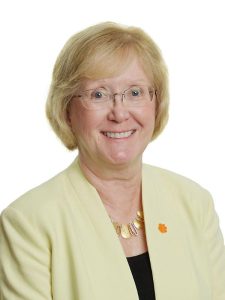Clemson professor Trudy Mackay elected to the National Academy of Medicine
October 21, 2024Trudy Mackay has been named Clemson’s first-ever member of the prestigious National Academy of Medicine, one of the highest honors in the fields of health and medicine.
Three academies make up the National Academies of Sciences, Engineering and Medicine — and Mackay is now a part of two of them, having been elected to the National Academy of Sciences in 2010.
“Trudy Mackay is a world-renowned researcher in the field of genetics. Her election to the National Academy of Medicine is a historic and exciting day for Clemson University,” said President Jim Clements. “As Clemson’s first National Academy Member of Sciences and now our first National Academy Member of Medicine, Trudy continues to elevate our University’s research profile to new heights. I am thrilled that Trudy has received such an incredible honor, and I am excited to see how her research further transforms and positively impacts the lives of others for generations to come.”
The director of the Clemson University Center for Human Genetics, Mackay, was selected as one of the world’s leading geneticists for pioneering studies on the genetic architecture of complex traits and the discovery of fundamental principles of quantitative genetics with broad applications for medicine.
Mackay is among the 100 new members elected Monday by current NAM members. Election to the Academy recognizes individuals who have made major contributions to the advancement of medical sciences, health care and public health.
“I am very honored that the National Academy of Medicine recognizes the value of my model organism work with fruit flies, which has so much potential to impact human health,” Mackay said.
With Mackay’s election, there are now four NAM members currently working at universities in South Carolina — two at the Medical University of South Carolina and one at the University of South Carolina’s Arnold School of Public Health. Mackay is the only one elected to more than one Academy.
“Dr. Mackay is a pioneer in human genetics, and this spectacular honor is further recognition of Clemson’s excellence in improving lives through research,” said Cynthia Young, dean of Clemson’s College of Science. “Clemson continues to accelerate her vision of precision medicine — integrating a person’s genetics, environment and lifestyle leading to healthier lives.
ABOUT TRUDY MACKAY’S RESEARCH
Mackay’s groundbreaking research uses the common fruit fly Drosophila to discover the genetic roots of complex traits — traits that are influenced by multiple genes — that are important to human health.
Because about 70 percent of the genome of the common kitchen pest has a human counterpart, Mackay studies them to answer questions that have puzzled scientists for decades — why some people who use drugs or drink alcohol become addicted while others do not. Or why some people live a lot longer than others. Or why a genetic disorder severely affects some members of a family but causes only minor symptoms in others.
“The whole premise of genetic medicine is that once you know the genes involved, you understand the processes and networks, or the context in which those genes are involved, which often leads to drugs that can target those disease,” she said. “My work historically has been trying to identify those genes and understand those networks.”
Mackay did the first genotype-phenotype association studies in flies, looking at the relationship between genes and their observable characteristics. The work showed it was more complex than anyone realized.
She developed the Drosophila Genetic Reference Panel, a valuable resource used by researchers from all around the world. The panel includes more than 1,000 fly lines with fully sequenced genomes.
Mackay said model organisms are still valuable in research of human diseases.
“There’s only so far we can go with human research. We can make observations. We can do sequencing. But the only experiments we can do are on human-derived cell lines and possibly organoids (three-dimensional tissue cultures that are miniaturized versions of organs and are grown in a laboratory from stem cells),” she said. “I think that a deep biological and physiological understanding of disease will always come from the use of model organisms, and possibly not just one.”
Mackay sees a paradigm where researchers will pose a human problem and go to flies as a genetic model. Then, having delved into the relevant variants and genes in flies, go to other model organisms such as mice and zebrafish, or even rats, to get more information before closing the loop by going back to humans.
“I see it more as a life cycle than you either work with humans or fruit flies or rodents,” she said. “I think the more teams that do that, the more quickly we’re going to make advances.”
Mackay, the Self Family Endowed Chair of Human Genetics at Clemson, said the NAM honor will enhance Clemson’s advancement of precision medicine.
MORE ON TRUDY MACKAY
Her NAM election is the latest of many honors in Mackay’s career.
Last month, she was elected a Laureate Distinguished Fellow of the International Engineering and Technology Institute (IETI), an international organization dedicated to fostering interdisciplinary research and collaboration across engineering, technology and related scientific fields.
In 2021, she was elected to the American Philosophical Society, the oldest learned society in the United States, founded by Benjamin Franklin in 1743. Mackay is the first professor in the state of South Carolina and Clemson to become a member.
Mackay is a recipient of Trinity College’s Dawson Prize in Genetics, which is awarded to geneticists of international prominence. She is also a fellow of the American Association for the Advancement of Science, the American Academy of Arts and Sciences and the Royal Society of London. Mackay received the 2016 Wolf Prize for Agriculture.




















